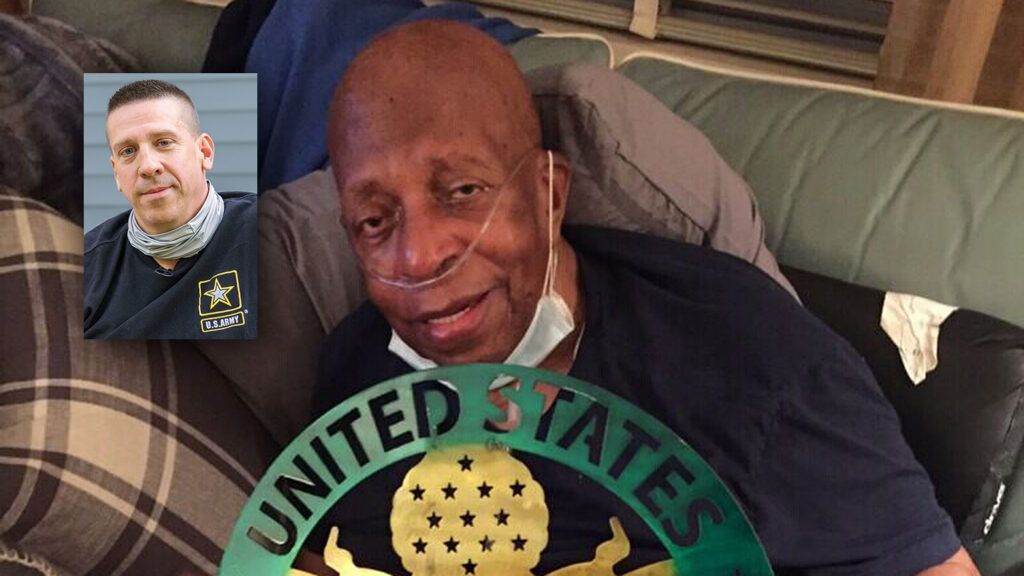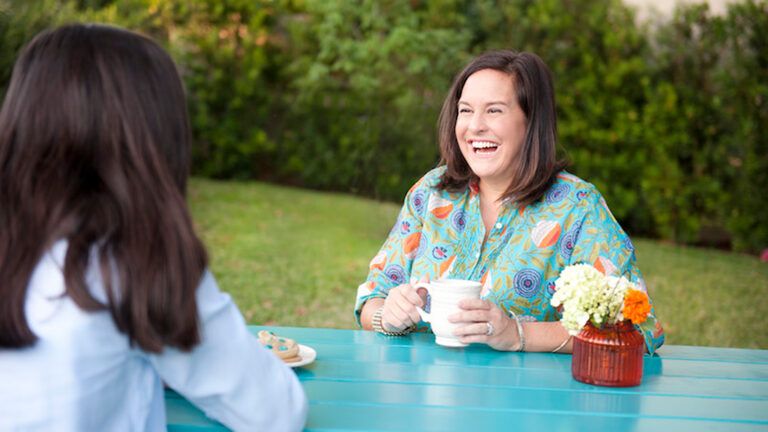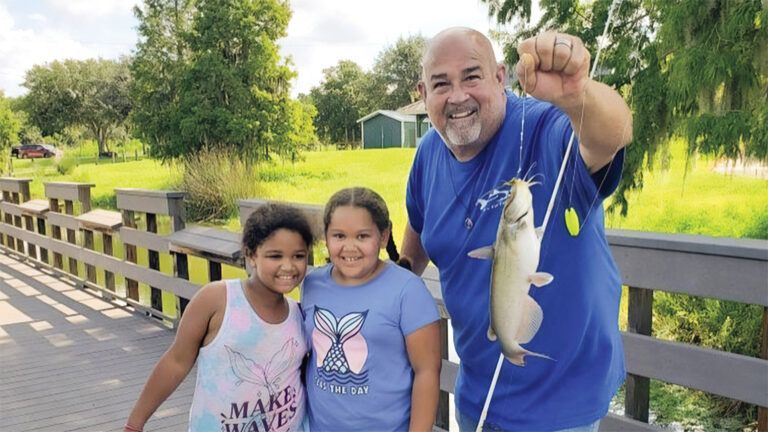Remember the television show Quantum Leap? I was fascinated by it as a teenager. In every episode, the main character, a physicist, leaped back in time and into someone else’s body and fixed something that had gone wrong in their lives. The idea of being able to make things right from the past stuck with me well into adulthood. Until fairly recently, in fact.
May 1, 2020. I’d seen my share of death and suffering in the two weeks I’d been deployed as an Army social worker at New York City’s Jacobi Medical Center. The Covid-19 crisis was unrelenting. My job was to sit with patients, a dozen or so visits a day, and listen. Offer comfort and hope. But was it too late for George Crouch, the frail elderly man in the bed in front of me?
Nurses told me he’d refused medical care and food since he’d lost his wife, Gail, to Covid-19 the day before. I sat next to his bed, outfitted in my PPE. His eyes were barely open, a solitary tear on his cheek. He was 96, a World War II veteran. One of the Greatest Generation.
“Sir, I’m Capt. Eric Dungan,” I said. “U.S. Army.” His eyes opened a crack. “I’m in the Reserves, not the Big Army like you.” An almost imperceptible smile creased his lips. Something, at least. I’d spent years as a social worker, but this deployment was my first time in uniform.
I’d joined the Reserves only six months earlier. My respect for veterans was a big part of why I’d signed up. My father, Jack, was a veteran of the Korean War era. I only wished he could have lived to see me in uniform, but he’d died in 2013.
I fixed my eyes on George’s. “You know what it’s like to battle,” I said. “You’ve got to stay strong.”
I talked for a few more minutes. No response. Finally, I stood, my six-foot, five-inch frame towering over him. I was almost to the door when I heard it.
“Rock steady.” The voice weak, the words unmistakable.
I turned. George looked as if he were asleep. His words echoed in my mind. Something my old man would have said. The same quiet strength.
I went back to see George that afternoon. The room was a hive of activity. “We’re taking him to an area where he can get more care,” a nurse said.
“Rock steady,” I said.
George slowly made a fist and gave a thumbs-up as they wheeled him out. I was off that weekend. all I did was worry about George. I cared about each of my patients, prayed for them each morning. Something about this guy tugged at me, though. It wasn’t just the way he reminded me of my dad. It felt almost as if I were being given a chance to atone for the mistakes of my youth, to make things right.
From the time I could walk, I was in awe of my dad. He was the salt of the earth. He’d served in an infantry unit in the Army. He’d worked on the assembly line at GM and done construction on the side. But he always made time for my older sister and brother and me. From helping people who were down on their luck to teaching me how to hit a jump shot, he was all-in.
Like when I was 15 and broke my leg playing basketball. I had a rod put in and was laid up for weeks. Dad sat with me every evening, boosting my spirits.
I wanted to be like him, the kind of guy you could count on. But several months later, when my sister needed me, I dropped the ball. Angie, 19, was about to have an operation to remove a tumor. She was scared and asked me to talk her through having surgery, since I’d had my leg worked on. I said I would sit with her the night before her operation. Then friends invited me to play video games.
I forgot my promise. Angie’s tumor turned out to be cancerous. I was guilt-stricken. Even though Angie and I were close, I couldn’t bring myself to help my parents with her care, for fear that I’d let her down again. I couldn’t bear to be confronted with her illness and my inadequacy.
I was in college, majoring in criminal justice, when Angie died. I’d failed my sister, my parents, and now I’d never get to make it up to them. I went off the rails. I quit studying. The only way I could escape my guilt and grief was watching that TV show Quantum Leap.
I graduated, barely, in 1997. I tried the police academy but dropped out after a few weeks. Then I decided to join the Army. The recruiter learned about the rod in my leg and said I’d never pass the medical exam. It felt like final confirmation that I’d never be the man Dad was.
Not that Dad ever said he was disappointed in me. He just urged me to trust God to lead me. That’s how he lived his life. But how could I trust God when I couldn’t even trust myself?
I drifted until I landed a job as a case manager for an agency serving troubled youth in Muncie, Indiana. I found myself connecting with the kids. I understood how lost they felt.
By 2004, I’d been working several years as a case manager. A colleague said to me, “You know VA hospitals are looking for clinical social workers. Could be a great opportunity if you got a master’s degree.”
The idea intrigued me. I’d never lost my admiration for veterans. The University of Louisville had a good social work program. Enrolling would mean driving five hours every weekend for two years. I applied, heard nothing from the admissions office. I wasn’t surprised, given my lackluster college GPA. I figured that was that, like so many other things in my life.
But Dad wouldn’t let it go so easily. “Go down there and see someone faceto- face,” he kept saying to me. Finally I took off work and made the drive. The woman I met with put through my admission on the spot. There’d been a mix-up with my application.
Without Dad, I would never have become a licensed clinical social worker. Never have devoted the past 14 years to working with veterans, making him proud. I would never have heard the Army Reserves needed social workers (this time, my leg wasn’t an issue) or deployed to New York City at the height of the Covid-19 pandemic.
Without Dad, I would never have learned to ask God to guide me, to help me in my work and with my patients. The way I asked God on Monday morning before I ran to check on George. He was on forced oxygen. He lay so still, his eyes shut. “Keep fighting,” I whispered. I squeezed his shoulder and went to finish my rounds.
The next day, his eyes were open. The nurse said he wouldn’t eat and had pulled out his IV. “George, you can’t give up,” I said.
He turned his head toward me, then jerked the oxygen mask from his face. “What do you want me to do?”
“I want you to live,” I said. “You don’t have to die.”
He scowled. The room turned still, just the quiet whoosh of the oxygen.
Finally he picked up his spoon and ate some applesauce. He extended his arm to the nurse to reinsert the IV. She shook her head in disbelief. I looked to George. Another tear on his cheek.
“I can’t pretend to know what you’re going through,” I said. “But I promise you, you still have a lot to live for.”
I checked back that afternoon. He was sleeping peacefully. The nurse said he’d eaten his entire breakfast. He was still sleeping Friday afternoon. “He’s really weak,” the nurse said.
I thought of the last hours I’d spent with my dad, who’d died of a respiratory disease. We watched a Louisville basketball game in his hospital room. I wanted to spend the night, but he wanted me to go home. Early the next morning, the hospital called. He’d passed away during the night. Died on his terms. I wondered if George would be the same way.
Monday morning, I found George had been moved to a unit for patients in recovery. “He’s like a new man,” the nurse told me in the hallway. Really? Doctors and nurses were usually cautious in describing a patient’s condition.
I poked my head inside the room. There was George, sitting up in bed. His eyes lit up when he saw me. “Hey, where you been?” he said.
I laughed. “You look great,” I said. “I told you you’re a warrior. Now I want to see you keep it up.”
“You got that right,” George said. “Rock steady.”
I pulled a chair close to his bed. “Where were you in the war?” I asked.
“Okinawa,” he said. “We lost some good men. Then Korea. I made sergeant. Yeah, I’ve seen some things.”
He told me about serving in a segregated unit. The discrimination he’d faced. How it had made him all the more determined. After his service, he’d bought a house in the Williamsbridge section of the Bronx. He had worked as a lab tech at City College and later taught chemistry. He’d married Gail late in life, in his early fifties.
“I miss her so much,” George said, getting choked up. “It took me so long in life to finally find her. It’s hard to think about going on without her.”
“Understood. You don’t get over losing someone you love like that.” I held his hand and thought about my sister.
We fell silent. And in that silence, something passed between us. An understanding. A quantum leap of the spirit. There was no undoing the past. I couldn’t bring back my sister or my dad any more than George could bring back his beloved Gail. But God gave us a life to be lived forward, a life with unexpected gifts, like the bond forming between George and me.
In the days that followed, I told the others in my unit, as well as the doctors and nurses at the hospital who’d served in the military, about George. They streamed into his room, giving him patches from their units.
Word spread outside the hospital. A Marine sent him a World War II Veteran cap. After each visit, George sat up a little straighter, his face more animated. Other patients asked about him. He’d become a source of hope to the entire hospital. Almost a celebrity.
Two weeks after we met, George was discharged to a rehabilitation center. He wore his World War II Veteran cap. Cheering doctors and nurses lined the hallways as he left the hospital. I was at his side. A New York Times article followed. People needed all the hope they could get, and George symbolized that hope amidst the worst of the Covid scourge. He was his own quantum leap.
“I love you, dude,” I said. “You’re not done with me. I’m calling you every day.”
George looked up at me and squeezed my hand. “I love you too,” he said. “Rock steady.”
For more inspiring stories, subscribe to Guideposts magazine.





